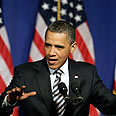
Good day for Obama
Photo: AP
Osama bin Laden was the most hated man in America; the devil incarnate - the man who dared strike the US on its own soil and hit its most important economic and defense symbols. The trauma inflicted on the US prompted the war in Afghanistan, which still goes on, and also contributed to the decision to launch the war on Iraq, which hasn't ended either.
Bin Laden and al-Qaeda inspired radical Islamic groups worldwide. His assassination conveys a firm message similar to the one Israel conveys under similar circumstances: Even if it takes a long time, at the end of the day our long arms shall reach their target.
There is no doubt that bin Laden's assassination is a great achievement for the US as a nation and for President Obama as a leader and politician, more so on the symbolic, PR front than in terms of practical results on the ground.
Bin Laden
Ron Ben-Yishai
Commentary: Ron Ben-Yishai says murderous, fanatic Islam still there, with or without Bin Laden
During Obama's tenure at the White House, the US lost much of its global stature, mostly in the Middle East. Thus far, Obama failed to realize any objectives earmarked as foreign policy priorities. He is perceived, by enemies and friends alike, as a weak, inexperienced leader who does not know where to lead America.
The doubts regarding his conduct grew in recent months, following his zigzags, contradictory attitude and inexplicable evasions in respect to the Arab world unrest. Now, bin Laden's assassination may grant him an opportunity to restore America's global and regional status and regain its leadership position. However, he still needs to prove that he is capable of taking advantage of this opportunity.
Bin Laden's killing may also hold important implications for America's domestic affairs. The assassination may close a circle and improve the image and performance of US intelligence agencies. They failed gravely in thwarting the September 11 attacks and in Iraq and thus lost the faith of broad sections of the Administration, Congress and the public. More than anything else, a free and active bin Laden highlighted their helplessness and inability to act.
During the Bush and Obama terms, the ideological and political rift within American society grew deeply. The mutual hostility between Democrats and Republicans and between liberals and conservatives intensified. For one moment at least, US society may rally around the leader who brought up the hoped-for result. However, the assassination will not prompt an overly dramatic change in the relationship between the rival groups, and it is doubtful whether it will have significant implications on the next presidential elections in November 2012.
More pressure on Israel?
The presidential race is already underway, and Obama announced that he intends to run for a second term in office. Thus far, the public gave Obama low grades on his conduct both domestically and internationally, and he sustained a harsh defeat in Congress elections last November.There is no doubt that in the short run, bin Laden's assassination will score Obama many points, boost his approval rating and help him enlist support and resources for his campaign. However, the presidential elections are still far off, and his chances will be determined by the economic situation a year from now as well as the identity of the Republican candidate.
In his speech, Obama again made a distinction between violent, radical Islam represented by bin Laden – which should be fought with force – and moderate Islam, which deserves our cooperation. This distinction was also presented at the beginning of his term in office, at his reconciliation speeches in Ankara and in Cairo.
Yet thus far, this strategy hasn't worked. Arab world polls have shown broad, deep hostility to the US over its values and its democratic, free lifestyle. It is doubtful whether bin Laden's assassination, and reiteration of the distinction between the two types of Islam, will help Obama elicit the cooperation he wants. Indeed, the hostility and violence against the US in the Middle East may grow.
Following the expected improvement in his status both domestically and abroad, Obama can again think about exerting more pressure on Mideastern elements that thus far evaded or thwarted moves which the US wanted to advance. For example, he can boost the pressure on Israel to propose an initiative that would facilitate alks with the Palestinians and avert their plan to seek UN recognition for an independent state. In his upcoming visit to Washington, Netanyahu may find a somewhat tougher president.
Indeed, one dramatic event, the assassination of bin Laden, may hold interesting implications for the US, the world, the Middle East and Israel.
Professor Eytan Gilboa is an expert on US affairs, heads the Center for International Communication, senior researcher at the Begin-Sadat Center for Strategic Studies at Bar-Ilan University
- Follow Ynetnews on Facebook















